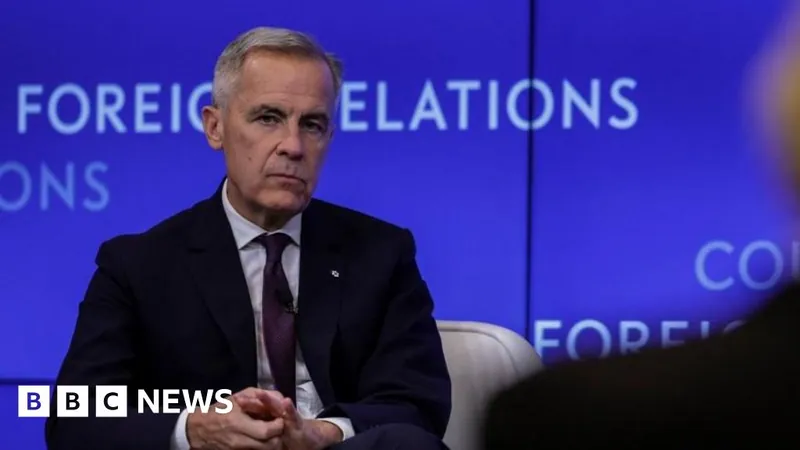
Canada's Golden Opportunity: Will It Capitalize on US H-1B Visa Changes?
2025-09-23
Author: Emily
With President Donald Trump dramatically increasing fees for the H-1B visa program, experts are urging Canada to welcome the influx of skilled workers fleeing the restrictions of the U.S.
In a recent speech at the Council of Foreign Relations in New York City, Canadian Prime Minister Mark Carney acknowledged the potential brain drain, lamenting that much of Canada’s homegrown talent in research and AI tends to migrate south. He quipped to the U.S. audience, "I understand you're changing your visa policy. Maybe we can hang on to one or two of them."
Trump's jaw-dropping announcement last week revealed a staggering new fee of $100,000 for H-1B applications, sending shockwaves through the tech industry that has historically relied on this visa to employ foreign talent legally.
The changes, which have already come into effect, are set to limit pathways for highly educated foreigners, particularly recent international graduates of U.S. universities seeking long-term employment. While current H-1B holders remain unaffected, the prospect of a smaller pool for new entrants has left many searching for alternatives.
Canadian immigration lawyer Evan Green sees this as a prime opportunity for Canada. In his view, the Canadian government should act swiftly to attract those American-bound jobs.
A recent memo from Build Canada, a non-profit dedicated to enhancing the country’s productivity, echoed this sentiment. The memo urged the government to act quickly, stating, "Hundreds of thousands of highly skilled H-1B professionals are now seeking a new home," with Canada standing out as a prime destination.
Canada boasts world-class research institutions, similar time zones, proximity to the U.S., and an exceptional quality of life—all attractive features for foreign talent.
Historical studies demonstrate that when U.S. immigration laws tighten, businesses have sought talent elsewhere. A study from the University of Pennsylvania specifically noted a migration of skilled workers to Canada following 2004 visa restrictions.
In 2023, Canada launched a program that allowed U.S.-based H-1B holders to apply for three-year work permits, which was met with overwhelming demand, closing within 24 hours with 10,000 applications.
While some have successfully relocated, including clients of Calgary-based lawyer Mark Holthe, many are still facing hurdles with permanent residency, adding uncertainty to their future in Canada.
Economist Mikal Skuterud warns that Canada must revamp its immigration system to truly compete for this new wave of talent. He argues that while the potential is certainly there, it shouldn’t be overstated. Recent cuts to immigration numbers and political tensions over the foreign worker program have raised concerns.
Skuterud states, "Canada does not appear significantly more predictable than the U.S. to attract talent," with the wage structure generally lower than that of the U.S.
Nevertheless, he believes Canada has an obligation to seize this moment. The historical economic benefits of the H-1B program in the U.S., particularly in the tech sector, underscore the significance of attracting skilled workers.
In response to these developments, an IRCC spokesperson highlighted existing pathways for skilled workers to enter Canada, including the Express Entry program and the Global Skills Strategy, aimed at fast-tracking permits for highly skilled individuals.
As Canada stands at this pivotal crossroads, the question remains: Will it fully embrace this unprecedented opportunity to attract talent? The clock is ticking.









 Brasil (PT)
Brasil (PT)
 Canada (EN)
Canada (EN)
 Chile (ES)
Chile (ES)
 Česko (CS)
Česko (CS)
 대한민국 (KO)
대한민국 (KO)
 España (ES)
España (ES)
 France (FR)
France (FR)
 Hong Kong (EN)
Hong Kong (EN)
 Italia (IT)
Italia (IT)
 日本 (JA)
日本 (JA)
 Magyarország (HU)
Magyarország (HU)
 Norge (NO)
Norge (NO)
 Polska (PL)
Polska (PL)
 Schweiz (DE)
Schweiz (DE)
 Singapore (EN)
Singapore (EN)
 Sverige (SV)
Sverige (SV)
 Suomi (FI)
Suomi (FI)
 Türkiye (TR)
Türkiye (TR)
 الإمارات العربية المتحدة (AR)
الإمارات العربية المتحدة (AR)